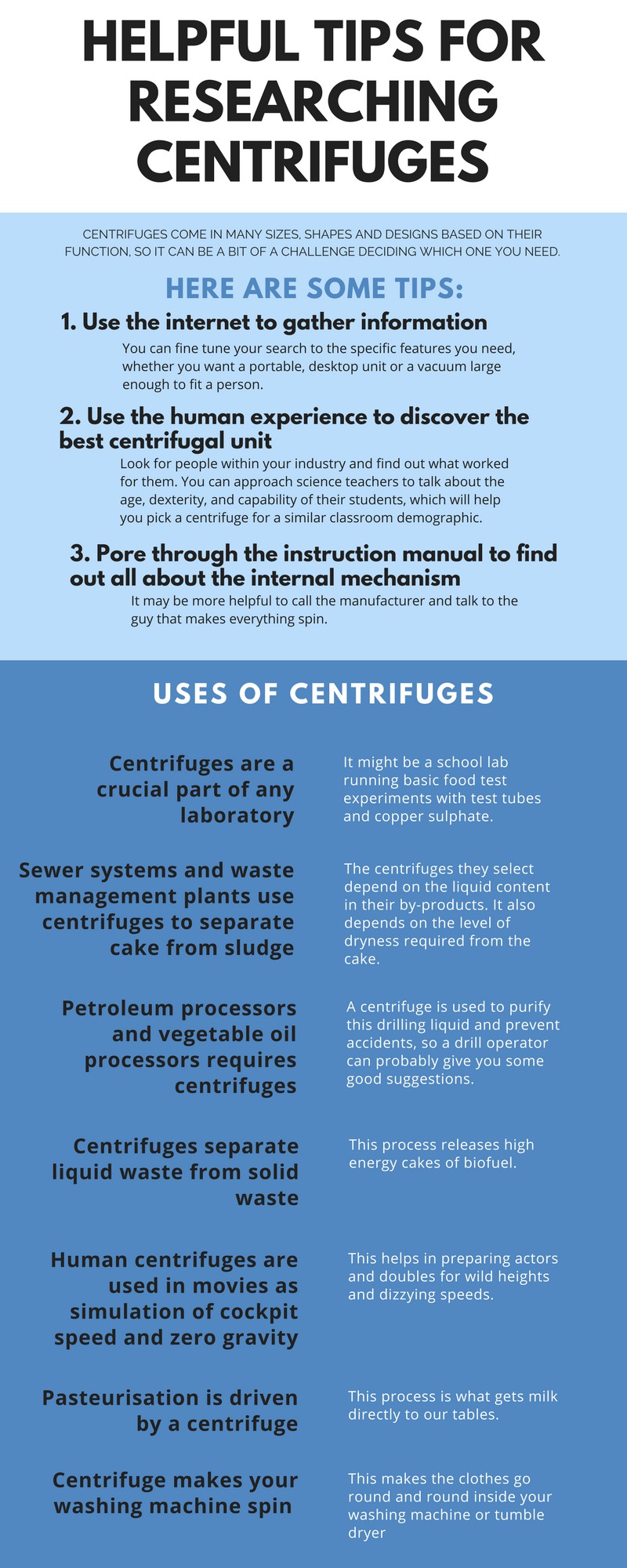Centrifuges come in many sizes, shapes and designs based on their function, so it can be a bit of a challenge deciding which one you need. The first place anyone goes when they’re trying to gather information is the internet. You can fine tune your search to the specific features you need, whether you want a portable, desktop unit or a vacuum large enough to fit a person. You can also use the human experience to discover the best centrifugal unit. Look for people within your industry and find out what worked for them.
Centrifuges are a crucial part of any laboratory. It might be a school lab running basic food test experiments with test tubes and copper sulphate. Or it might be a medical lab separating blood from plasma to find out how to fight a specific infection. You can approach science teachers to talk about the age, dexterity, and capability of their students, which will help you pick a centrifuge for a similar classroom demographic. Hospital lab assistants can similarly tell you the kinds of tests that they commonly perform, or the diseases that are common in that region. This information will help you pick a suitable centrifuge for a lab setting.

Sewer systems and waste management plants use centrifuges to separate cake from sludge. The centrifuges they select depend on the liquid content in their by-products. It also depends on the level of dryness required from the cake. Talk to technicians at an industrial recycling plant for advice on the best centrifuge when it comes to waste water management.
Two other industrial processes that require centrifuges are petroleum processors and vegetable oil processors. In the former, drilling fluid sometimes contains solids and contaminants that can damage the machines. A centrifuge is used to purify this drilling liquid and prevent accidents, so a drill operator can probably give you some good suggestions. For the latter, visit a vegetable refinery. They use centrifuges to develop oil for use in different forms of cooking. These oils vary in their melting point, viscosity, and source material, so if you ask the resident food scientist, they can help you know what’s what.
Biodiesel is produced at both local and commercial levels. Some farmers collect their animal wastes and process them on-site using simple, portable machinery. Others sell their waste to commercial fuel dealers who take it to their factories and treat large volumes in a more cost-efficient manner. The centrifuges separate liquid waste from solid waste to release high energy cakes of biofuel. If you’d like to know what machinery they use, you can ask any number of people, from the machine operator to the delivery guy who brings the machines to the plants. The maintenance guy or girl can be helpful too, since they keep the centrifuge in good condition so they know a thing or two about it.
One of the most exciting uses of centrifuges is probably one you didn’t consider. If you’ve watched any movies about pilots and astronauts, you know they undergo intense training to prepare them for the wild heights and dizzying speeds they will face. These highly skilled daredevils are often placed into human centrifuges as a simulation of cockpit speed and zero gravity. The pilots and space professionals might not know much about the centrifuges, but if you can get your hands on a space engineer, they can probably point you in the right direction.
Of course if you’re having trouble acquiring NASA credentials, you could opt for the next best thing. Disneyland has an attraction called Mission: Space with gives kids (and their parents) an experience of what it’s like to be in outer space. The device runs on a centrifuge, and if you talk to the operator, he will probably give you some tips on how to source and maintain a similar machine.
Closer home, we wouldn’t have our most basic food item without a centrifuge. Pasteurisation is driven by a centrifuge, and that process is what gets milk directly to our tables. Even if you have your own cow, you probably supply your excess milk to a dairy that processes it centrifugally before packaging it for customers. Get in touch with the chief machinist at a commercial dairy and he can show you what dairy centrifuges are about.
Finally, what makes the clothes go round and round inside your washing machine or tumble dryer? You guessed it. You could probably pore through the instruction manual to find out all about the internal mechanism, but it may be more helpful to call the manufacturer and talk to the guy that makes everything spin.
When you’re in the market for a centrifuge, start by defining its intended function, then identify people and places that use their devices in a similar way. Ask them nicely and they’ll be glad to help you find the perfect one for your needs.
Read Also:



